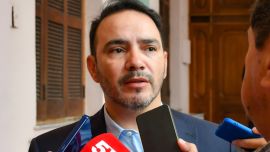There’s a curious thing about trying to project the future in that the conditions are constantly changing. What I believe today will happen in 2023 may be very different to what I’ll believe in a day, a week, or a month. In this context, the weight of the accusation against Cristina Fernández de Kirchner in a corruption trial known as ‘Vialidad’ has put the whole socio-political ecosystem in flux, granting the vice-president a centrality that even she probably did not expect. An expert in issues of political power, Fernández de Kirchner took full advantage of the opportunity, shepherding the entire and quite diverse pan-Peronist front that is the Frente de Todos behind her as she flirts with a potential 2023 presidential candidacy.
Everything is connected, of course. As explained several times in this column, the chance that Cristina will go to prison any time soon is extremely unlikely. The tribunal hasn’t even heard the defence’s case, after which they must reach a sentence that can be appealed to a higher court. Ultimately, the Supreme Court will have to make a call and we’re talking about 2025 at least. Whatever she decides to do will trigger a series of actions across the political arena that could set a very different stage for 2023 than previously expected. That’s the lens under which this whole circus must be analysed.
The conventional wisdom before prosecutor Diego Luciani laid down his accusation against CFK was that both she and Mauricio Macri would be forced to sit the presidential election out given prohibitive negative figures in public opinion polls. President Alberto Fernández, along with Cristina’s son Máximo Kirchner, Buenos Aires Province Governor Axel Kicillof, and the empowered Sergio Massa were all in the same boat. Alberto dreamed of re-election if the economy improved, but the ascension of Massa into a lead role as “Super” Economy Minister has all but hammered the nail in the coffin. In Massa’s case, his ambition took him to the hottest seat in the house with the expectation that it could take him to the Casa Rosada next year or position him favourably for 2027. At 50, he’s still young enough for the presidency. Kicillof would have a tough re-election race but could use the Peronists’ “home advantage” in the Conurbano to pull a difficult victory out of the bag. He would be joined by Fernández de Kirchner on the campaign trail, as she was expected to go for a Senate seat in the nation’s largest province, while they would need to find a place for Máximo either in Buenos Aires or Santa Cruz.
Can Cristina dream of the Casa Rosada rather than the Senate next year? In a recent poll put together by Opinaia political consultancy firm, CFK would handily win the PASO primaries. Asked who one would vote for in a presidential election, Fernández de Kirchner would take 13 percent of the vote, compared with six percent for Alberto and five percent for Massa. In total, the Frente de Todos coalition would earn 28 percent of the vote, just two points behind Juntos por el Cambio. Interestingly, Macri and PRO party leader Patricia Bullrich would take eight percent each, while Buenos Aire City Mayor Horacio Rodríguez Larreta would come in at six percent. Finally, the single most “voted for” candidate would be libertarian economist Javier Miliei, with 18 percent. A game-changing 14 percent remained undecided. When the question changes from individuals to political parties (or in this case coalitions), Frente de Todos has a voting intention figure of 42 percent compared to 52 percent for Juntos por el Cambio.
The previous scenario suggested the de facto fragmentation of the ruling coalition, but ‘Cristina 2023’ requires it remain united. The mirror image of this is Macri, who is evaluating his chances as he increases his public exposure. He has pumped the figure of Bullrich, who acted as a counterweight to Rodríguez Larreta, and who could appeal to right-wingers that would consider changing their vote from the Milei-Espert camp if it was functional enough to beat the Peronists. Bullrich knows that at 66 years old, this is her last real chance, and she’s still one of the only politicians with positive figures in opinion polls. Even Rodríguez Larreta has slid into negative territory in some surveys. Bullrich would step aside if Macri wanted to compete, meaning the City Mayor will have to fight a war on two fronts. Those close to Rodríguez Larreta are confident that he could pull through, keeping the coalition united and taking the PASO primaries, but they aren’t counting on Macri throwing his hat in the ring. They believe it’s just an attempt to regain some centrality and relevance after Rodríguez Larreta got his way in the 2021 midterms. Former first lady Juliana Awada wouldn’t be up for another round, they say, reassuring themselves of what they’d like to believe.
The return of the former presidents has further cast Alberto Fernández into obsolescence, while helping Frente de Todos push the economic situation to the background for a bit. Rampant inflation could reach 100 percent this year, and Massa’s month-long tenure at the Economy Ministry has come with a lot of talk but very little in terms of concrete action. The “Super Minister” promised he’d raise US$5 billion in reserves to fill the Central Bank’s depleted coffers. He’ll be making the rounds in the Seat of the Empire soon, where he’s expected to unveil some sort of plan to International Monetary Fund chief Kristalina Georgieva. “Argentina still lacks a comprehensive policy plan under Massa,” says Fitch Ratings, noting, “fiscal metrics are deteriorating net of accounting manoeuvres, and the cap on Central Bank financing of the Treasury is not a strong monetary anchor. Reserves are falling despite broadly supportive terms of trade, signalling that unresolved home-grown issues are to blame.” Regardless, the IMF’s own projections suggest Argentina will grow four percent this year after a whopping 10.4 percent last year, the second-highest among South America’s largest economies behind Colombia (6.3 percent). While the United States is expected to slow down to one percent in 2023, embattled Argentina would expand three percent if it continues this mediocre pace. Massa might just have been lucky enough to be in the right place at the right time.
Getting back to the former presidents, Mauricio and Cristina are playing their cards ahead of 2023. They’ve modified the political scenario and could be gunning for the “Superclásico”: a Macri-Kirchner face-off. I doubt it, but what I think today may soon change.






















Comments